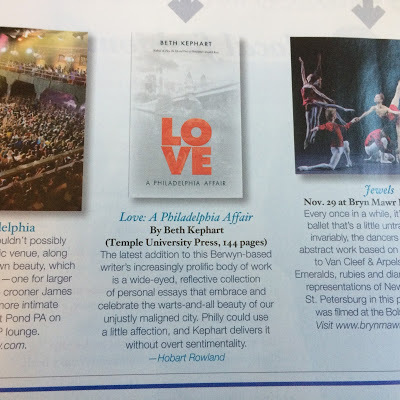Beth Kephart's Blog, page 34
November 5, 2015
cures for literary heartbreak
 Look for me behind stacks of books. That's where I'm living lately.
Look for me behind stacks of books. That's where I'm living lately.Assembling the content for a traveling multi-day memoir workshop. Preparing to teach the personal essay during a morning/afternoon at a Frenchtown high school. Knitting together ideas for a four-hour Sunday memoir workshop, next weekend, at the Rat (also in Frenchtown; places still available). Conjuring poem-engendering exercises for the fourth and fifth graders of North Philly. Building the syllabus for my next semester of teaching at Penn. Putting more touches onto the Beltran Family Teaching Award event at Penn next spring (featuring Rahna Reiko Rizzuto, Margo Rabb, and A.S. King). Re-reading Buzz Bissinger so that I can introduce and then publicly converse with him at the Kelly Writers House this Saturday, for Penn's Homecoming. Talking to Jennie Nash about an online memoir workshop. Writing the talk I'll give this evening to kick off the LOVE event (featuring film students and Philadelphians) at the Ambler theater.
My writing (my novels) sit in a corner over there, where they have sat for most of this year. I'm sunk deep into the pages of other people's work. Their stories, their sentences, their churn: a thrilling habitation.
Every time I feel frustrated by a sense of career stall or perpetual overlook, I remember this: There are writers—truly great writers—who have gone before me, who have written more wisely, who have seen more clearly. I may want to be noticed, I may hope to be seen, I may wish to be important, a priority, first on a list, but honestly? Why waste time worrying all that when there is so much to be learned—about literature, about life—from the writers who have gone before—and ahead—of me.
James Agee. Annie Dillard. Eudora Welty. We could stop right there. Read all they've written. Make the study of them the year we live and it would be enough. It would be time well spent, time spent growing, time during which we learn again that aspiration must, in the end, be contextual. We can't hope to stand on a mountain's top if we don't acknowledge all the boulders and the trees and the ascent and the views that rumble beneath the peak.
My cure for my own sometimes literary heartbreak: Sink deep inside the work of others. Recall what greatness is.




Published on November 05, 2015 04:56
November 4, 2015
Video from Bank Street—a reading of One Thing Stolen, a conversation with interesting writers
Was so very happy to be there, among the Bank Street writers and thinkers. This is our panel—Vicky Smith, Tim Wynne-Jones, and Daniel Jose Older (and me).
We read a few pages from each of our books in the early part of this video—Daniel reads Shadowshaper, I read from One Thing Stolen, Tim reads from The Emperor of Any Place. And then we answer the truly thoughtful, provocative questions provided to us/for us by Vicky Smith of Kirkus Reviews.
A treasured day.




Published on November 04, 2015 10:28
November 3, 2015
Be concise. Then stretch like elastic. The wisdom of Paul West
 Paul West—a novel innovator, a proponent of risk, a teacher who, by his own accounting in Master Class, challenged, abraded and applauded—recently passed away. He had been living in the aftermath of a stroke that had rearranged his language. He'd been living loved by his wife, the writer Diane Ackerman.
Paul West—a novel innovator, a proponent of risk, a teacher who, by his own accounting in Master Class, challenged, abraded and applauded—recently passed away. He had been living in the aftermath of a stroke that had rearranged his language. He'd been living loved by his wife, the writer Diane Ackerman.In honor of his passing I went back last night and re-read passages of Master Class—a plea for originality, a template for the new. Perhaps I like this book so much because I side with West. I believe in the unusual mix.
But let's give the words today to Mr. West himself. A passage from his account of a final class.
From time to time I encourage them to see their work in an almost Dionysian way, at its most creative, trying to experiment in every sentence, not through wild excess but with timing, almost covert touches that will transform a phrase. Be concise to begin with, I tell them, and then stretch it out like elastic, filling in all the spaces.




Published on November 03, 2015 04:00
November 2, 2015
what is authoritative? scenes from the Laurel Hill Mansion

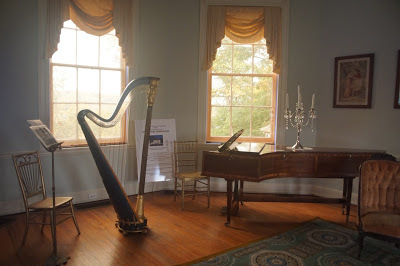
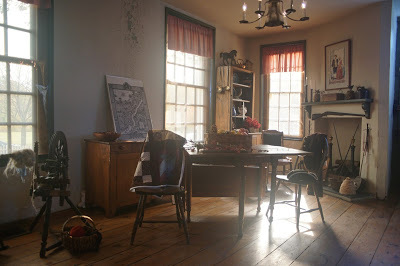 I don't know what "authoritative" feels like, but I'm sure I'll never get there. There's always something more to learn, something more to see, some question I don't have answers for, someone with a better story. I'm reminded of that every day, and increasingly, as I travel around our city to speak to those who have worked on its behalf.
I don't know what "authoritative" feels like, but I'm sure I'll never get there. There's always something more to learn, something more to see, some question I don't have answers for, someone with a better story. I'm reminded of that every day, and increasingly, as I travel around our city to speak to those who have worked on its behalf.Yesterday, at Laurel Hill Mansion, I met with the women who have helped ensure that this centuries-old home in Fairmount Park East still thrives. Musicians come to play in the summer there. People arrive and talk. Harry K. gives tours to visitors from Germany, California, and elsewhere. Sylvia, 91-years-young, recalls the work the Women for Greater Philadelphia did to open this house during the Bicentennial.
I took a few photos while I was there. That's Phyllis Kauffman looking out over the Schuylkill River from the Laurel Hill Mansion back porch. Phyllis was once a librarian in Pennsylvania's third largest library. Oh, does she, too, have stories to tell.
With special thanks to the very beautiful Ann of The Spiral Bookcase, a joyful community indie in Manayunk that supports authors and their dreams—and readers, too. Ann graciously joined us yesterday. And you can meet her again this Thursday, at the Ambler theater, where we will be celebrating LOVE as the community's Let's Discuss It title.
(We'll be doing far more than that—celebrating Temple University film students, celebrating the memories of Philadelphians, celebrating libraries and librarians. It's a fest. Details are here.)




Published on November 02, 2015 03:31
November 1, 2015
the books of lately
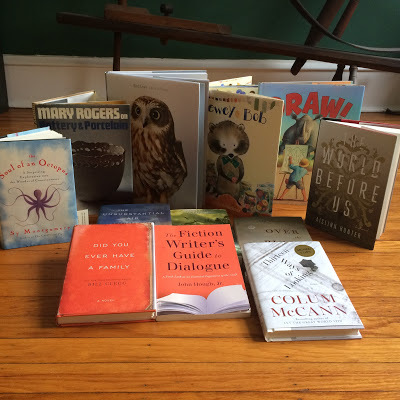 Over the past two weeks I have acquired all these books. One is actually a loaner (thank you, Kelly Kelly Kelly, for the borrow), one I've already written about here, one will be integral to an afternoon at Penn in the spring, and the rest are coming toward me, nesting within me.
Over the past two weeks I have acquired all these books. One is actually a loaner (thank you, Kelly Kelly Kelly, for the borrow), one I've already written about here, one will be integral to an afternoon at Penn in the spring, and the rest are coming toward me, nesting within me.This is the benefit of being out in the world. And, most absolutely, being out of my own head.




Published on November 01, 2015 09:07
launching an unusually unusual memoir workshop series
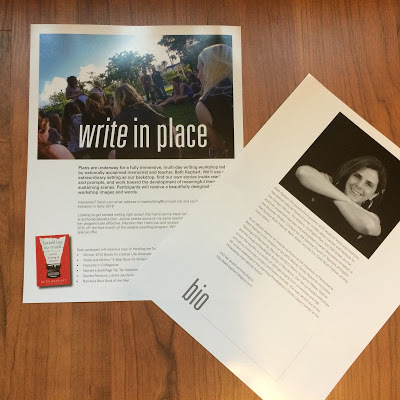 In 2016 I'll be rolling out a traveling memoir workshop series—a multi-day immersive event that will focus not just on finding the kind of truth I explore in Handling the Truth: On the Writing of Memoir, but on pinning it effectively to the page. We'll be conducting these workshops against the backdrop of especially beautiful places and using a surprising range of tools and readings to get to the heart of our stories.
In 2016 I'll be rolling out a traveling memoir workshop series—a multi-day immersive event that will focus not just on finding the kind of truth I explore in Handling the Truth: On the Writing of Memoir, but on pinning it effectively to the page. We'll be conducting these workshops against the backdrop of especially beautiful places and using a surprising range of tools and readings to get to the heart of our stories.If you are interested in learning more, please let me know with a comment here.




Published on November 01, 2015 04:54
October 31, 2015
an interview about memoir and the city in Arrive magazine (the one with Patti Smith on the cover!)
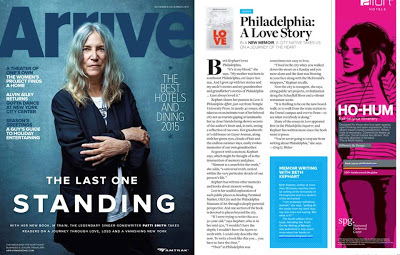 Patti Smith is on the cover of the current issue of Arrive magazine (the Amtrak magazine). That's really enough, by any measure. She's gorgeously photographed—silvers and blues.
Patti Smith is on the cover of the current issue of Arrive magazine (the Amtrak magazine). That's really enough, by any measure. She's gorgeously photographed—silvers and blues.Tucked inside that edition is an interview with me about Love and about memoir. Greg Weber and I had the nicest conversation many weeks ago. Reading these words today brings all of that back to me.
I'm grateful. I'm so grateful that I think I'll ride Amtrak every day now, for months.




Published on October 31, 2015 06:58
"without overt sentimentality" Thank you, Main Line Today
Published on October 31, 2015 06:37
October 30, 2015
remembering my grandmother today
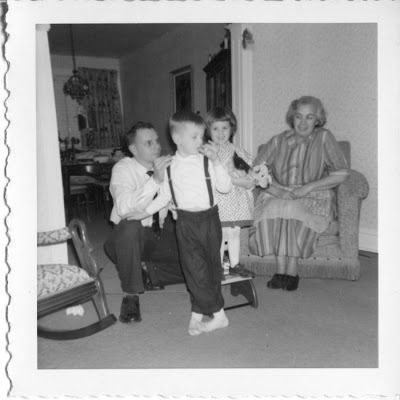 Many years ago, on this day, I lost this beautiful lady, my maternal grandmother. Here we are, in her home at Guyer Avenue.
Many years ago, on this day, I lost this beautiful lady, my maternal grandmother. Here we are, in her home at Guyer Avenue.Grandmom, I always watch the skies on this day for you. They are full of your colors.




Published on October 30, 2015 10:33
October 29, 2015
Can anyone write a good book? Book Coach Jennie Nash, Meaning, and a Special Offer
 And there she is. That soaring tower. That beacon at the edge of Manhattan, collecting the city lights.
And there she is. That soaring tower. That beacon at the edge of Manhattan, collecting the city lights.For the past two days on this blog, I've been interviewing Jennie Nash, a friend who has given authors a new kind of tool—and experience—called Author Accelerator. I've been interviewing Jennie because she has approached this business of book coaching and author support in an entirely new way. She's studied what hasn't worked elsewhere. She's created a program that rises above—provides content, individualized attention, and motivating ideas.
So here is the third and final installment of our series. We talk about characters, intention, and the publishing biz. Find Part 1 of our conversation here. Find Part 2 here. And don't forget Jennie's special offer: a discount to try out Author Accelerator for a month. The normal price is $199/month, which gives writers four deadlines against which they turn in ten pages for review. Jennie is offering a discounted price of $150 for the first months. Authors can write to Jade@Authoraccelerator.com and ask for the Beth Kephart special offer. That will be good through November 15, 2015.
<!-- /* Font Definitions */ @font-face {font-family:"MS 明朝"; mso-font-charset:78; mso-generic-font-family:auto; mso-font-pitch:variable; mso-font-signature:1 0 16778247 0 131072 0;} @font-face {font-family:Calibri; panose-1:2 15 5 2 2 2 4 3 2 4; mso-font-charset:0; mso-generic-font-family:auto; mso-font-pitch:variable; mso-font-signature:3 0 0 0 1 0;} @font-face {font-family:Cambria; panose-1:2 4 5 3 5 4 6 3 2 4; mso-font-charset:0; mso-generic-font-family:auto; mso-font-pitch:variable; mso-font-signature:3 0 0 0 1 0;} /* Style Definitions */ p.MsoNormal, li.MsoNormal, div.MsoNormal {mso-style-parent:""; margin:0in; margin-bottom:.0001pt; mso-pagination:widow-orphan; font-size:12.0pt; font-family:"Times New Roman"; mso-ascii-font-family:Cambria; mso-ascii-theme-font:minor-latin; mso-fareast-font-family:"MS 明朝"; mso-fareast-theme-font:minor-fareast; mso-hansi-font-family:Cambria; mso-hansi-theme-font:minor-latin; mso-bidi-font-family:"Times New Roman"; mso-bidi-theme-font:minor-bidi;} @page Section1 {size:8.5in 11.0in; margin:1.0in 1.25in 1.0in 1.25in; mso-header-margin:.5in; mso-footer-margin:.5in; mso-paper-source:0;} div.Section1 {page:Section1;} </style> <br /><div class="MsoNormal"><span style="color: #0b5394;"><b><span style="background: white none repeat scroll 0% 0%; font-family: Calibri; font-size: 11pt;">What makes a character interesting, and how do help authors think about and manage complexity?</span></b></span></div><span style="color: #0b5394;"><b> </b></span><br /><div class="MsoNormal"><br /></div><div class="MsoNormal"><span style="background: white; color: #548dd4; font-family: Calibri; font-size: 11.0pt; mso-bidi-font-family: "Times New Roman"; mso-fareast-font-family: "Times New Roman";">The whole reason we tell each other stories is to find meaning in the world, and in our lives. We’re desperately hungry for meaning – and when stories give it to us, you cannot tear us away. So it’s meaning that makes a character interesting. If we can see ourselves in a character, if we can learn something about ourselves by watching their struggle, we will not be able to put the book down.</span></div><div class="MsoNormal"><br /></div><div class="MsoNormal"><span style="background: white; color: #548dd4; font-family: Calibri; font-size: 11.0pt; mso-bidi-font-family: "Times New Roman"; mso-fareast-font-family: "Times New Roman";">The Peanuts cartoons are much in the news right now because the new Peanuts movie is about to come out, and if you read anything at all about Charles Schultz, you realize that his gift was being able to convey meaning in those tiny little four-panel comic strips. The fact that he and his characters became beloved is a direct result of the meaning he made. I mean, Charlie Brown getting his heart broken one more time by the Little Red-haired Girl ignoring him, or Lucy duping him – we all feel what Charlie Brown feels, and we feel it in our bones, because the same things have happened to us at one time or another.</span></div><div class="MsoNormal"><br /></div><div class="MsoNormal"><span style="background: white; color: #548dd4; font-family: Calibri; font-size: 11.0pt; mso-bidi-font-family: "Times New Roman"; mso-fareast-font-family: "Times New Roman";">So the question you are asking (I think!) is how I do I help authors make characters who mean something?</span></div><div class="MsoNormal"><br /></div><div class="MsoNormal"><span style="background: white; color: #548dd4; font-family: Calibri; font-size: 11.0pt; mso-bidi-font-family: "Times New Roman"; mso-fareast-font-family: "Times New Roman";">Everything goes back to intention. What point are they trying to make through this character or through this narrative? If the writer doesn’t know, she might as well quit right now. Once she knows, then it’s a matter of creating that structure (or shape or ecosystem) to best show that point.</span></div><div class="MsoNormal"><br /></div><div class="MsoNormal"><span style="background: white; color: #548dd4; font-family: Calibri; font-size: 11.0pt; mso-bidi-font-family: "Times New Roman"; mso-fareast-font-family: "Times New Roman";">And once authors do <i style="mso-bidi-font-style: normal;">that</i>, I teach them what meaning looks like on the page – how to let us into a character’s head, and into his skin, at every single turn. We have to know what a character thinks and feels, what meaning he makes of what is happening to him. So I point out where the writers are doing it, and where they miss the mark, so they can begin to build that muscle.</span></div><div class="MsoNormal"><br /></div><div class="MsoNormal"><span style="color: black; font-family: Calibri; font-size: 11.0pt; mso-bidi-font-family: "Times New Roman"; mso-fareast-font-family: "Times New Roman";"><b><span style="color: #0b5394;"><span style="background: white;">We often want to think, as writers, that our work comes to us intuitively—that we can’t see chapter ten until we’ve lived chapters two and three. How have you helped your clients tame their desire for fuzzy ambiguity in the name of a process that leads to a finished, polished work?</span></span></b></span></div><div class="MsoNormal"><br /></div><div class="MsoNormal"><span style="color: #548dd4;">I have come to believe that while any given creative act is not linear (and not, therefore, able to be tamed) the creative process <i style="mso-bidi-font-style: normal;">itself</i> is somewhat predictable and knowable and it is, therefore, able to be tamed to a certain extent.</span></div><div class="MsoNormal"><br /></div><div class="MsoNormal"><span style="color: #548dd4;">What I offer my clients is the benefit of my experience with the creative process. They may not have written a book before, or written THIS book before, but I have helped dozens and dozens, of writers through the process of writing a book and I am not surprised, or upset, or concerned by the things that happen on that journey. If someone wants to throw out six months of work and start all over again, I have seen that before. I know that it doesn’t have to be the death knell for the project. If someone drags his feet in finishing a book (which happens all the time!) I know that this is par for the course. Writers get spooked when the end is near and may need a little extra attention to get over the finish line.</span></div><div class="MsoNormal"><br /></div><div class="MsoNormal"><span style="color: #548dd4;">I recently had a client who fell into total despair, for example, because she was convinced that her work was crap, that she was crap, that she would never be able to actually write a book -- but I have seen a hundred writers in that exact place before. Maybe they fell into that dark place three months earlier in the process than this writer did, or three months later, or a year later, but <i style="mso-bidi-font-style: normal;">when</i> it happens in the process is not the point. The point is that it <i style="mso-bidi-font-style: normal;">happens</i>, and that it’s <i style="mso-bidi-font-style: normal;">normal</i>, and that I have seen writers write their way out of it time and time again. I know this woman’s story and I know it is not crap, and I believe she can do it. So I help her find her way back to her story. </span></div><div class="MsoNormal"><br /></div><div class="MsoNormal"><span style="color: #548dd4;">My clients often say that it seems as though I can see their book – envision it complete and finished and out in the world in readers’ hands – before they can, and I think this is actually true. I can <i style="mso-bidi-font-style: normal;">see</i> their book. And I hold that idea in my mind for them when they may not be able to. It’s almost as if I act as a bridge to get them over the chasm of doubt. They can’t see their book yet but I can. </span></div><div class="MsoNormal"><br /></div><div class="MsoNormal"><span style="color: #548dd4;">The question that would naturally follow is, “Do I believe that <i style="mso-bidi-font-style: normal;">anyone</i>can write a good book?” The answer is, yes – and no. I don’t think it’s about talent, whatever that is. And I know that it’s not about having a good idea, because there are a million good ideas. It’s about being willing to commit, being able to tolerate the chaos of the creative process, and being willing to hold in your head the needs of the reader even when you can’t yet see the complete book, or don’t know what’s coming in Chapter 10, or don’t know how you’ll get there. If you can do those things, then yes – I believe anyone can write a good book.</span></div><div class="MsoNormal"><br /></div><div class="MsoNormal"><span style="color: #548dd4;">It bears saying that not all my clients publish their books or meet with commercial success. Publishing is a fickle thing, and so much depends on luck and timing. But what I have found is that <i style="mso-bidi-font-style: normal;">finishing</i> is the best part of the process by far. When a writer actually finishes the book, he feels a deep soul-level satisfaction that he can’t access in any other way. Talking about writing a book is one thing, but actually doing it is something else entirely. I consider it an enormous honor to be able to help writers get there. <a href="https://www.blogger.com/null" name="_GoBack"></a></span></div><div class="feedflare">
<a href="http://feeds.feedburner.com/~ff/BethK... src="http://feeds.feedburner.com/~ff/BethK..." border="0"></img></a> <a href="http://feeds.feedburner.com/~ff/BethK... src="http://feeds.feedburner.com/~ff/BethK..." border="0"></img></a> <a href="http://feeds.feedburner.com/~ff/BethK... src="http://feeds.feedburner.com/~ff/BethK..." border="0"></img></a> <a href="http://feeds.feedburner.com/~ff/BethK... src="http://feeds.feedburner.com/~ff/BethK..." border="0"></img></a>
</div>
Published on October 29, 2015 17:30

